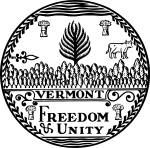| |||||||||||||||||
| |||||||||||||||||
Aiken: 50-60% 60-70% 70-80% 80-90% >90% Comings: 50-60% 60-70% 70-80% 80-90% | |||||||||||||||||
| |||||||||||||||||
| Elections in Vermont |
|---|
 |
The 1940 United States Senate special election in Vermont took place on November 5, 1940. Republican George Aiken was elected to the United States Senate to serve the remainder of the deceased Ernest W. Gibson, Sr.'s term, defeating Democratic candidate Herbert B. Comings. Aiken replaced Gibson's son, Ernest W. Gibson, Jr., who was appointed to fill the seat until a special election could be held.



